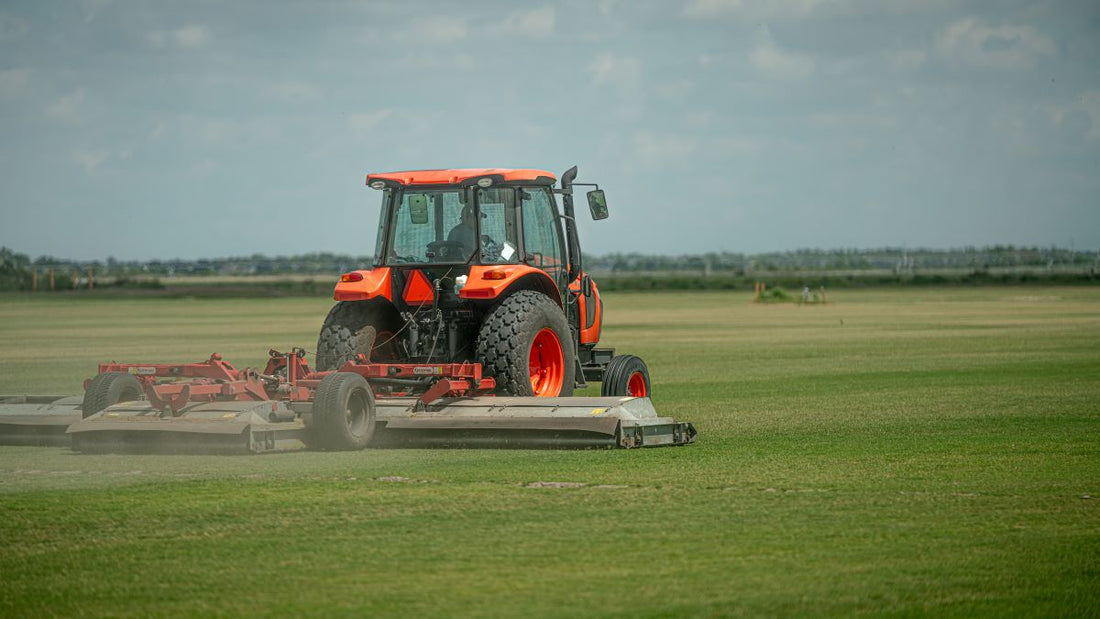
The Future of Turf: How New Grass Varieties Are Shaping Sustainable Lawn Care
Jamie TedderLush, green lawns are a hallmark of homes and parks, but maintaining them has traditionally come at a significant cost—high water usage, chemical treatments, and frequent upkeep. As environmental concerns intensify and sustainability becomes a growing priority, homeowners and landscapers are increasingly seeking eco-friendly yet aesthetically pleasing alternatives.
Advances in turfgrass breeding have emerged as a solution, introducing new grass varieties that require less water, fewer chemical inputs, and minimal upkeep while still delivering the rich, vibrant look we love. Bethel Farms aims to be at the forefront of these innovations that align with the demand for sustainable lawn care, creating a balance between performance and environmental responsibility. These cultivars are positioned to shape the future of lawn care.
The Need for Sustainable Grass Solutions
Traditional lawns have long been associated with environmental challenges, including excessive water use, chemical dependency, and high maintenance requirements. As environmental concerns rise, homeowners and industry leaders are seeking more sustainable alternatives.
This shift is evident in local regulations. For example, some parts of Southwest Florida enforce year-round water restrictions, limiting lawn irrigation to no more than twice a week during specific hours. While these restrictions conserve water, they also encourage best practices for lawn care—such as deep, infrequent watering—that promote healthier, deeper root growth.
Why New Grasses Are Key to Sustainable Landscapes and Lawn Care
Recent advancements in turfgrass breeding are transforming how we maintain our landscapes. Modern grasses are being developed to be more drought-tolerant, pest-resistant, and low-maintenance, ensuring resilience in various environmental conditions. Researchers are focused on creating varieties that can endure diverse climates, heavy foot traffic, and environmental stress, all essential elements for sustainability—especially in areas like Florida, where heat and drought are common challenges.
Bethel Farms, with 65 years of experience in sod cultivation, has consistently delivered innovative turfgrass solutions. Our latest grass varieties—Gateway Zoysiagrass and Durban Seashore Paspalum—are engineered for challenging conditions, offering exceptional durability and lasting visual appeal. Developed in partnership with MVP Genetics, a leader in high-performance vegetative turfgrass cultivars, these grasses are designed to thrive in harsh climates while supporting sustainable lawn care.

Key Grass Characteristics That Contribute to Sustainability
Bethel Farms is proud to offer innovative grass varieties that meet these sustainability needs. BIMINI® Bermuda, for example, is a fine-textured variety known for its drought tolerance and rapid recovery from wear, making it ideal for golf courses and high-traffic locations.
Gateway Zoysiagrass, on the other hand, is known for its minimal seed head production and versatility across various cutting heights, making it a great choice for home lawns, landscaping, golf courses, and sports turf. It is tough, recovers quickly, and thrives in high-traffic conditions while requiring fewer inputs. Gateway is bred for durability, including excellent winter color and uniformity, ranking consistently among the top performers in national turfgrass evaluations. Meanwhile, Durban Seashore Paspalum excels in coastal areas, with superior salt tolerance, making it ideal for waterfront properties and sports fields.
Water Efficiency and Drought Resistance
The development of modern turfgrass hybrids and improved varieties that require significantly less irrigation addresses growing concerns about water scarcity. These drought-resistant grasses maintain a healthy, green appearance with minimal water usage and can also go dormant during extended dry periods, conserving water until more favorable conditions return. This adaptability makes them a sustainable choice for drought-prone regions, keeping lawns vibrant without adding more strain to local water supplies.
Low-Maintenance
New turfgrass varieties are designed to reduce maintenance needs, making lawn care more manageable. Slow-growing grasses reduce mowing frequency, while disease-resistant cultivars reduce reliance on pesticides and fungicides. Some varieties are also self-repairing and highly tolerant of foot traffic, ensuring that high-use areas, such as sports fields and residential lawns, remain lush and healthy with minimal intervention.
Soil Health
Deep-rooted turfgrass varieties contribute significantly to soil health by improving stability and preventing erosion. Their root systems help bind the soil, reducing the risk of runoff during heavy rains and consequently supporting soil structure and biodiversity. Moreover, these grasses require fewer fertilizers, which decreases the risk of harmful runoff that can pollute nearby water sources.
Urban Sustainability
Sustainable turfgrass solutions also contribute to urban sustainability by enhancing green infrastructure. Parks, sports fields, and residential lawns benefit from resilient, climate-adapted grasses that reduce the urban heat island effect, improve air quality, and support local biodiversity. Integrating these grasses into urban landscapes helps create more resource-efficient and climate-resilient communities.

Future Trends in Turfgrass Development
The future of turfgrass is increasingly focused on sustainability, with ongoing research into genetically modified and hybrid grasses that require fewer water and chemical inputs. As environmental awareness continues to grow, the demand for sustainable lawn care solutions, like sod and grass plugs, is rising, as more homeowners, landscapers, and policymakers recognize the long-term benefits of eco-friendly lawn care.
These innovations are shaping the future of lawn care by emphasizing sustainability, resilience, and visual appeal. By embracing these advancements, homeowners and industry professionals alike can reduce resource consumption and foster healthier, more sustainable landscapes. Investing in sustainable turfgrass solutions, like our new, innovative grasses at Bethel Farms, will help create greener, more resilient outdoor spaces for future generations.

